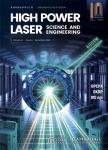Recent progress of laboratory astrophysics with intense lasers
Recent progress of laboratory astrophysics with intense lasers作者机构:School of EngineeringOsaka UniversitySuitaOsaka 565-0871Japan Institute of Laser EngineeringOsaka UniversitySuitaOsaka 565-0871Japan Institute of Radiation PhysicsHelmholtz Zentrum Dresden Rossendorf01328 DresdenGermany
出 版 物:《High Power Laser Science and Engineering》 (高功率激光科学与工程(英文版))
年 卷 期:2021年第9卷第4期
页 面:7-40页
核心收录:
学科分类:080901[工学-物理电子学] 07[理学] 0809[工学-电子科学与技术(可授工学、理学学位)] 08[工学] 080401[工学-精密仪器及机械] 070401[理学-天体物理] 0804[工学-仪器科学与技术] 0803[工学-光学工程] 0704[理学-天文学]
基 金:supported by the JSPS KAKENHI under Grant Nos.19K21865 19H00668 and 20KK0064
主 题:collisionless shock compressible hydrodynamics cosmic rays equation of state high-energy-density plasmas intense laser magnetic turbulence opacity experiment particle accelerations relativistic plasmas turbulent mixing wakefield acceleration Weibel instability
摘 要:Thanks to a rapid progress of high-power lasers since the birth of laser by *** in 1960,intense lasers have been developed mainly for studying the scientific feasibility of laser *** confinement fusion with an intense laser has attracted attention as a new future energy source after two oil crises in the 1970s and *** the beginning,the most challenging physics is known to be the hydrodynamic instability to realize the spherical implosion to achieve more than 1000 times the solid *** studies have been performed theoretically and experimentally on the hydrodynamic instability and resultant turbulent mixing of compressible *** such activities in the laboratory,the explosion of supernova SN1987A was observed in the sky on 23 February *** X-ray satellites have revealed that the hydrodynamic instability is a key issue to understand the physics of supernova *** collaboration between laser plasma researchers and astrophysicists,the laboratory astrophysics with intense lasers was proposed and promoted around the end of the *** original subject was mainly related to hydrodynamic ***,after two decades of laboratory astrophysics research,we can now find a diversity of research *** has been demonstrated theoretically and experimentally that a variety of nonlinear physics of collisionless plasmas can be studied in laser ablation plasmas in the last *** the present paper,we shed light on the recent 10 topics studied intensively in laboratory experiments.A brief review is given by citing recent ***,modeling cosmic-ray acceleration with lasers is reviewed in a following session as a special topic to be the future main topic in laboratory astrophysics research.



